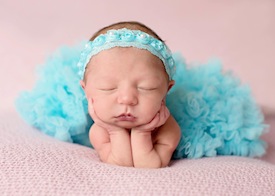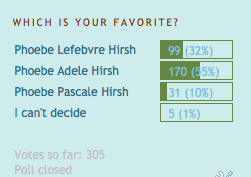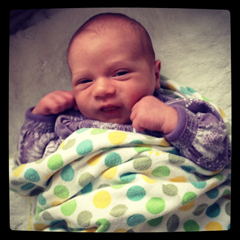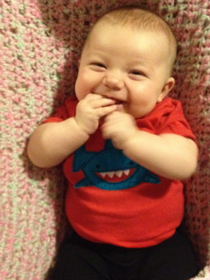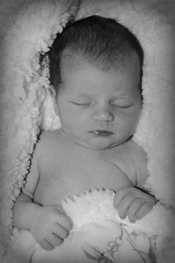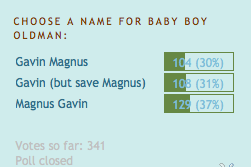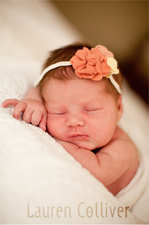Melanie writes:
I have a name question, which, while having no urgency at all, has been driving me crazy for years. I am only trying to get pregnant (unsuccessfully), and therefore have no impending infant to name. However, if I am lucky enough to have a child, I am very set on family names or variations thereof. My grandmother was very important to me and she died when I was young. She always made me promise to never ever name a child after her, as she hated her name – Constance L@vonia. Now L@vonia is truly awful but Constance is something I would consider, at least as a middle name. I just can’t though – I promised. Can you think of an alternative? Some way to honor my grandmother AND her wishes? Thanks!
PS – Id consider HER mother’s name except its a) not really my style and b) has already been used in my generation as an honor name. Other names on that side of the family were names my great great grandmother found in books and then altered to make then unique…and therefore are atrocious. (M3rle, P@lma, Aud@…)
This is a very, very interesting question to me, and it’s going to be an all-over-the-spectrum comments section, I can tell!
Here are the questions/issues, as I see them:
1. Who owns a name?
2. Who is allowed to name a child?
3. Do people really mean it when they say not to use their names?
4. Once the person has died, should their wishes on “not wanting to hear their own name on a baby” still matter? If so: why? (And at which point do their wishes trump your wishes?—see #s 1 and 2.)
5. Should anyone force a child to promise something like that?
6. If a child promises something like that, are they bound to it as an adult?
Let’s start with numbers 5 and 6. I’m reminded of my high school boyfriend, whose deathbed-residing grandfather made him promise to name a son after him. My boyfriend promised, and felt bound by that promise. My feeling on the subject: “YOU WERE SEVEN YEARS OLD AT THE TIME. That was incredibly emotionally manipulative, and totally out of bounds, and completely arrogant and inappropriate of him to demand a namesake, and also it seems pretty chauvinistic because WHAT ABOUT THE FUTURE MOTHER OF YOUR CHILD?? Doesn’t HER opinion count for anything?? ‘THE MAN’ gets to promise for both of them?? I THINK NOT!!”
Ahem. I might still be a bit steamed about it.
I think also of my mom’s grandmother, who was…er, enthusiastically involved with the Women’s Christian Temperance Union, and who made all her young grandchildren promise never to touch alcohol—and in fact made them SIGN A CONTRACT to that effect. Is my mother bound by that promise? Certainly not. She was not able to make a promise like that at her age (or to say no to making a promise like that), and my great-grandmother should not have asked her to.
Next I would like to turn attention to numbers 1 and 2, about who owns a name and about who is authorized to make the decision about what to name a baby. We’ve discussed name ownership before, mostly in the context of “Can you re-use a name a friend already used for her baby?,” and in general the idea is that names are many-time-use items (the friend wasn’t the first person to use it EITHER) (unless they actually WERE, but let’s keep this simple), but that we still might want to choose to go with other people’s preferences in the matter because the relationships (and the other people’s feelings) are important to us. But it’s also important to remember that this is because we are being LOVING AND CONSIDERATE PEOPLE (or because we fear conflict), not because we’re “not allowed” to “steal” a name. And what it boils down to is that there is no one who is designated caretaker of a particular name (not the parent of a child with that name, not someone who is named that name) who is allowed to decide who may and who may not use it. The name is available to any parent who wants to use it.
And I think we agree that the people who get to name the baby are that baby’s parents. Other people might give input or ideas, or might hope their family traditions are followed, or might even make the mistake of volunteering names they dislike—but the parents can completely ignore all of these suggestions. So although your grandmother could certainly have mentioned her preferences, she’s not actually allowed to name your future babies—or to tell you what NOT to name them, either.
To review where we are so far:
- adults should not extract these sorts of promises from children
- any such extracted promises are not binding
- your grandmother is not in charge of how her name is used
- your grandmother may not choose or forbid names for your baby
This all sounds rather harsh and anti-grandmother, doesn’t it? I don’t mean it to sound that way, or as if I think she was trying to do any of these things on purpose; however, I do think it’s important to separate things out so that we can move on to what your actual choices are.
This brings us to #3: Do people really mean it when they say not to use their names?
The thing is, people say stuff they don’t mean ALL THE TIME. We did a post recently that shows what I’m talking about: a woman wrote to us very distressed because she’d planned to name her baby after her dad—and then her dad (not knowing her plan) mentioned that he would “never forgive her” if she named a son after him. NEVER FORGIVE HER! That’s strong language! If her dad had then died before she named the baby, many many people would have said they felt very very strongly that his wishes should be respected. And yet: she talked to him about it and he was embarrassed about what he’d said, and he was surprised and flattered and very pleased when she said they wanted to name the baby after him. And so they did, and everyone was happy.
!!!!
That is, of course, not always going to be the situation. But my GUESS, my GUT FEELING, is that MOST of the time when people say they don’t want children named after them, they don’t actually mean that. Maybe they’ve just enjoyed many years of complaining about their name and this is another way to complain about it enjoyably, or maybe what they’re saying is “I hope you won’t feel like you have to use my name for a child”—but they’re thinking of their name in a different way than we would be. Someone named Henry in the last generation or two might have grown up thinking they had such a dorky, ugly, old-man name—please don’t name any babies after me! But now look: the name Henry is back in style and considered adorable and classic! The descendant doesn’t feel OBLIGATED to use it: they genuinely love the name and WANT to use it! They’re DISAPPOINTED that they have to “respect someone’s wishes”!
Meanwhile, if they went ahead and used it, the always-hated-the-name ancestor would likely suddenly discover they didn’t hate the name at all, and that they were intensely pleased and flattered to have it used. It might turn out that all those mentions of how much they hated their name were like when someone says “Excuse my house” or “I know I should dress more fashionably”: they don’t ACTUALLY feel bad about their house or their clothes, but they fear OTHERS are critical of them. Or they might be fishing for you to say you don’t think their name is so bad, or they might mean “Go ahead, twist my arm!”
So usually my suggestion would be to TALK to the person saying things about their name: be earnest, and say you’d actually really LIKE to use their name—would they truly hate that? Would it OFFEND them somehow, or is it just that they can’t believe anyone would want to use it?
But in your case, and in many similar cases, it isn’t possible to ask. Which brings us to our last point, point #4: Once a person has died, should their wishes on “not wanting to hear their own name on a baby” still matter? If so: why? Either those wishes are now as gone as the person who had them, or else it seems highly unlikely that such things are important in the person’s new eternal point of view.
Even if we imagine a person’s living earthly wishes persisting into eternity, at which point do another person’s wishes trump yours? I think the wish-trumping point comes down to this: Who was in charge of the decision/possession? My mother is in charge of her private journals; if she asks me to make sure they’re burned after she dies, I will do that: her wishes continue to matter after she dies. My grandmother is in charge of her earrings; I wouldn’t have fussed if she’d chosen to leave them to my cousin: her wishes continue to matter after she dies. I respect their wishes to do what they want with their own things, even after their lives are over.
But you are in charge of choosing your babies’ names, and so your love and respect for your grandmother aren’t affected by you going with your own wishes rather than following her wishes—any more than your love and respect for her would be changed by you choosing a different spouse, career, hobby, house, or piercing than she wished you to have. In this case, she would need to respect your wishes to do what you want with your own things.
To review where we are so far:
- adults should not extract these sorts of promises from children
- any such extracted promises are not binding
- your grandmother is not in charge of how her name is used
- your grandmother may not choose or forbid names for your baby
- people don’t always mean what they say about not using their names
- people’s wishes should be respected for their own decisions/possessions
So to me, what we have so far is pretty clear: you can name your baby whatever you want, including the name that your grandmother was named. And since she has died, this makes things both more difficult (because you can’t ask her if she really meant it, and likely find out to your happiness that she didn’t) and simpler (because she is not going to be angry and upset that you went against what she wanted).
It is, however, true that you can’t honor both your grandmother AND the wishes she said she had. It would honor her if you used her name (even if she truly didn’t want you to use it), but it would not honor her stated wishes. You will need to decide which is more important to you: honoring her through your child’s name as you’d like to do, according to your own wishes; or doing what your grandmother used to say she wanted you to do, when she was alive and had wishes.
For me, it would not be difficult: I would be using the name for my own sake, because I wanted to think fondly of my grandmother every time I thought of my daughter’s name, and because I wanted to say “You were named for my grandmother; I was very close to her.” And because in our culture, using someone’s name for a child is a way to show honor and love for someone, and I would want to do that. And because I would think it was unlikely that my grandmother would truly have been upset if I’d used her name for her dear great-granddaughter. I might feel glad that I wouldn’t have to be stressed about whether or not I was right about that—but I think I would also feel confident that if my grandmother could know what I had done, that she would at this stage of her existence be pleased by it.
Name update!
Hi Swistle,
I wrote to you some time ago about using my grandmother’s name, Constance, against her wishes. I had my daughter last year! I discussed my grandmother’s name with my husband, my grandfather (& his new wife), my dad (she was his mother), & my great-uncle (my grandmother’s younger brother). My husband was not a big fan, & neither were the men who knew my grandmother best, her husband and brother. My generation and my dad’s generation all thought it would be wonderful – & none of my relatives knew she had expressly forbade using her name! Apparently she only told me…
After 4 nameless days in the NICU, we named our daughter Cl@ire Suz@nne – a C name for my grandmother, & Suz@nne for my mother who was absolutely thrilled with a tiny namesake. I just kept thinking of my grandmother’s face when she told me not to name a baby after her and couldn’t do it. And my great-uncle told me when she was about 8 weeks old that Claire is a family name on their side as well, way way back somewhere!
Thank you for all of your help! Maybe we’ll be writing to you again in the future!
Melanie
